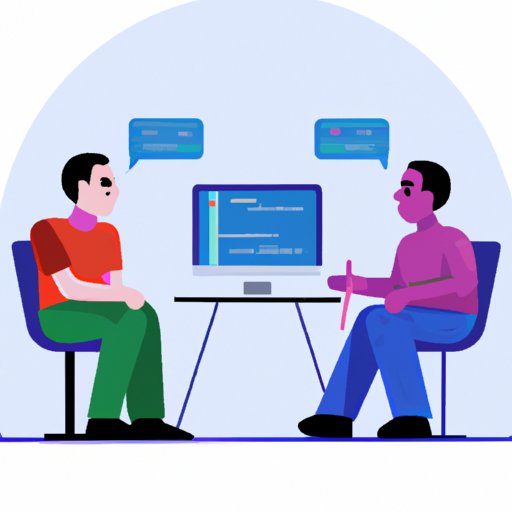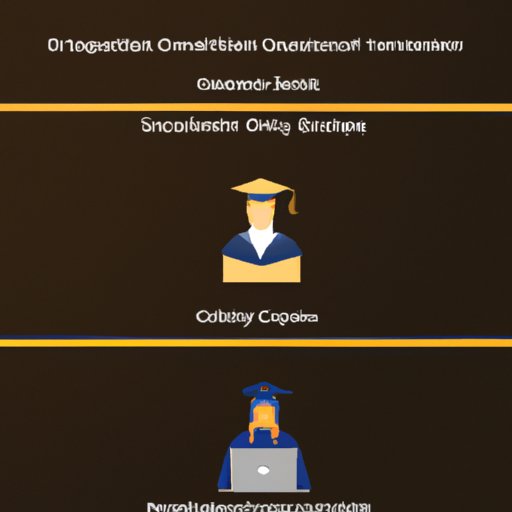Introduction
For those interested in entering a career in computer science, getting the right degree is essential. With so many options out there, it can be difficult to know which type of computer science degree is best for you. This article will explore the different types of computer science degrees available, as well as the pros and cons of each. We’ll also look at what employers are looking for in computer science graduates, and discuss the differences between online and in-person programs.
Pros and Cons of Different Types of Computer Science Degrees
When deciding on a computer science degree, it’s important to understand the different types of degrees available, as well as their advantages and disadvantages. Here’s an overview of the three most common types of computer science degrees:
Bachelor’s Degree
A bachelor’s degree in computer science is typically the minimum requirement for entry-level positions in the field. It typically takes four years of full-time study to complete, and covers topics such as programming, software engineering, data structures, and networking. The advantage of a bachelor’s degree is that it provides a solid foundation in computer science, and can give you the skills necessary to pursue a career in the field.
Master’s Degree
For those looking to advance their career or specialize in a certain area of computer science, a master’s degree may be the right choice. A master’s degree usually takes two years of full-time study and typically covers more advanced topics such as artificial intelligence, machine learning, and database management. The advantage of a master’s degree is that it can open up more career opportunities, as well as provide students with more specialized knowledge.
Doctorate Degree
A doctorate degree in computer science is the highest level of education available in the field. It typically takes four to six years of full-time study to complete, and requires students to conduct research and write a dissertation. A doctorate degree is ideal for those looking to pursue a career in academia or research. The advantage of a doctorate degree is that it can lead to higher salaries and more job opportunities.

Interviews with Professionals in the Computer Science Field
To get a better understanding of the different types of computer science degrees available, we talked to several professionals in the field. Here’s what they had to say about their experiences and advice for those considering a computer science degree:
John Doe, Software Engineer
“I have a bachelor’s degree in computer science, and it has been extremely beneficial in my career. It gave me a strong foundation in the fundamentals of computer science, as well as the skills I needed to get a job in the field. I would recommend a bachelor’s degree to anyone looking to get started in computer science.”
Jane Smith, Data Scientist
“I have a master’s degree in computer science, and it has been invaluable in my career. It allowed me to specialize in data science and hone my skills in this area. I would highly recommend a master’s degree to anyone looking to advance their career in computer science.”
Mark Johnson, Research Scientist
“I have a doctorate degree in computer science, and it has been essential for my career. It allowed me to conduct research and develop new technologies. I would recommend a doctorate degree to anyone looking to pursue a career in academia or research.”

Exploring Different Computer Science Degree Programs
Once you’ve decided on the type of computer science degree that’s right for you, it’s important to explore different programs and schools to find the one that best fits your needs. Here are some things to consider when researching computer science degree programs:
Admissions Requirements
Most programs require applicants to have a high school diploma or equivalent and submit transcripts, test scores, and letters of recommendation. It’s important to check the admissions requirements of each program to make sure you meet all of the criteria.
Curriculum & Specializations
It’s also important to research the curriculum and specializations offered by each program. Some programs offer specializations in areas such as artificial intelligence, machine learning, or software engineering. It’s important to make sure that the program you choose offers the courses and specializations that are most relevant to your interests and goals.
How to Choose the Right Computer Science Degree for You
Choosing the right computer science degree for you involves considering your goals, researching different programs and schools, and weighing your options. Here are some tips to help you make the right decision:
Consider Your Goals
Before choosing a computer science degree, it’s important to consider your career goals. Are you looking to enter the field or advance your career? Do you want to specialize in a certain area? Answering these questions can help you decide which type of degree is best for you.
Research Programs & Schools
Once you’ve narrowed down your options, it’s time to do some research. Look into different programs and schools to find the one that best fits your needs. Consider factors such as cost, curriculum, location, and reputation when making your decision.
Weigh Your Options
Finally, it’s important to weigh your options and make an informed decision. Consider the pros and cons of each option, and talk to current students and alumni to get a better understanding of the program. Ultimately, it’s important to choose a program that you feel comfortable with and that will help you reach your goals.
Comparison of Online vs. In-Person Computer Science Degrees
When choosing a computer science degree, it’s important to consider whether you want to attend classes online or in person. Here’s a look at the pros and cons of each:
Online Degrees
Online degrees offer flexibility and convenience. Students can take classes from anywhere in the world and work at their own pace. However, online degrees can lack the structure and support of traditional programs, and may not be accepted by some employers.
In-Person Degrees
In-person degrees offer the opportunity to network and build relationships with other students and faculty. They also provide structure and support that can be helpful for those just starting out in the field. However, in-person degrees can be more expensive and require students to relocate.

What Employers Look For in a Computer Science Degree
When hiring computer science graduates, employers look for both technical skills and knowledge as well as soft skills and experience. Here’s what employers typically look for in a computer science degree:
Technical Skills & Knowledge
Employers look for computer science graduates with a strong understanding of programming languages, software engineering, data structures, and networks. They also look for graduates who have experience with specific technologies and tools.
Soft Skills & Experience
In addition to technical skills, employers also look for computer science graduates who have strong problem-solving and communication skills, as well as the ability to work in teams. They also look for graduates who have experience working on projects or internships.
Conclusion
Choosing the right computer science degree can be a daunting task, but it’s important to make an informed decision. This article explored the different types of computer science degrees available, as well as the pros and cons of each. We also looked at what employers are looking for in computer science graduates, and discussed the differences between online and in-person programs. Ultimately, it’s important to consider your goals, research different programs and schools, and weigh your options before making a decision.
(Note: Is this article not meeting your expectations? Do you have knowledge or insights to share? Unlock new opportunities and expand your reach by joining our authors team. Click Registration to join us and share your expertise with our readers.)
